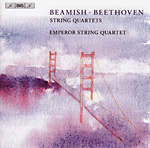The rationale behind this unique program goes beyond the usual mixing a “big name” with a lesser-known composer to bolster CD sales. Sally Beamish’s String Quartet No. 2 (2000) actually is based on Beethoven’s No. 4, which sensibly precedes it on the disc, allowing for direct and immediate reference. Beamish confines herself to the Beethoven’s first-movement exposition for her plundering, taking the first subject, bridge passage, second subject, and the following bridge passage as the starting points for each of her four movements. Thus, Beethoven’s stern theme becomes a syncopated jazz dance, while the remaining movements of this brief (10 minutes) work are equally inventive and thought-provoking in their expansion and re-imagining of the original material. The Opus California subtitle refers to the Golden Gate Bridge and Natural Bridges that inspired the second movement and finale.
Beamish’s First String Quartet (1999) also draws upon other sources. In this case she employs folk music of various cultures, including the Ukraine, Turkey, and Africa, for the last three movements. The resulting vibrant rhythmic energy, tonal variety, and folk coloring makes the music sound something akin to Bartók’s works in the genre. In contrast, the stoic first movement, with its widely spaced intervals and declamatory character, evokes a rugged North American spirit.
The Emperor String Quartet’s performances, which were recorded in the presence of the composer, capture the adventurous character of Beamish’s music as well as we might imagine; the Beethoven also is bursting with energy, although it lacks the refinement and sense of lived-in mastery you hear with the Alban Berg, Mosaiques, or Emerson Quartets. BIS’s highly-detailed recording tends toward brightness but has solid presence and wide dynamics. Recommended.
































